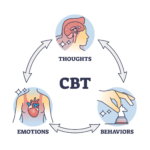High Functioning Anxiety
Many of us are familiar with the concept of anxiety; it’s a widespread, commonly diagnosed mental health condition. What if, however, the anxiety was masquerading behind a veil of high productivity and achievement? This is where the concept of High Functioning Anxiety (HFA) comes into play.
What is High Functioning Anxiety?
High Functioning Anxiety (HFA) isn’t a recognized mental health diagnosis. It’s a term widely used to describe those who live with anxiety, but can still maintain high performance levels and execute daily functions effectively.
For those with HFA, anxiety might serve as a driving force that pushes them to perform or achieve more, which can look like a virtue. Therefore, it often goes unnoticed, as it can look like high productivity and meticulousness on the surface.
Defining High Functioning Anxiety: Causes, Symptoms, and Effects
Like any form of anxiety, the causes of HFA are often multifaceted, combining genetic and environmental factors. Having a family history of mental health difficulties, certain formative and later life experiences, and one’s specific personality traits can all contribute to HFA.
Symptoms of high functioning anxiety can be quite subtle and may be mistaken for personality traits rather than a mental health issue. People with HFA might demonstrate:
- Perfectionism
- Constant overthinking or rumination of thoughts
- Difficulty saying no
- Restlessness
- Fear of letting others down
- A need to be continuously busy
While these symptoms can lead to high productivity and often success in professional settings, they come with a price. Long term effects of HFA may include chronic tension and fatigue, burnout, insomnia, and physical health issues like gastrointestinal problems or headaches due to chronic stress.
For those of you with HFA, it’s important to recognize that these symptoms demonstrate that you are out of balance. Qualities that could be positive, such as meticulousness and attention to detail, have become central instead of simply integrated into yourself. If you have HFA, you are out of balance in terms of flexibility, self love, and being connected to things that bring in-the-moment joy. Instead, you are more aligned with rigidity, fear and control.
What is the Difference Between High Functioning Anxiety and Traditional Anxiety?
The distinction between HFA and traditional anxiety lies primarily in how symptoms manifest and affect a person’s life.
Traditional anxiety disorders often lead to a noticeable impairment in daily functioning, like difficulty holding a job, maintaining relationships, or handling daily tasks. A more commonly diagnosed form of anxiety is Generalized Anxiety Disorder (GAD) which involves a persistent and excessive worry or dread across many different scenarios and which significantly impacts quality of life.
Conversely, people with high functioning anxiety often maintain a high level of functioning and can hide their symptoms well, which can sometimes lead to delayed diagnosis and treatment. They might even thrive on the stress and restlessness, using it as fuel for productivity.
The Importance of Early Intervention: Recognizing and Addressing High Functioning Anxiety
Early recognition and intervention in HFA are crucial to prevent potential long-term physical and psychological effects. If you identify with the symptoms of HFA, it’s essential to take steps toward managing it.
This can begin with:
- Self-awareness – recognizing and acknowledging these feelings rather than dismissing them as normal stress or simply part of your personality
- Establishing a regular self care routine
- Practicing mindfulness
- Engaging in regular physical activity
It is essential to remember that it’s okay to ask for help. Connecting with others experiencing similar symptoms can provide a sense of community and decrease feelings of isolation often associated with HFA.
Exploring Treatment Options: Diverse Therapy Approaches to HFA
Making lifestyle changes can be an empowering first step if you have high functioning anxiety; however, a comprehensive and lasting treatment plan often calls for work with a mental health professional. The following are beneficial therapeutic methods:
- Cognitive Behavioral Therapy (CBT) guides you in unpacking problematic thoughts, beliefs and behaviors and replacing them with healthier ones.
- Acceptance and Commitment Therapy (ACT) and other mindfulness-based approaches help you foster a healthier relationship with your anxiety, and focus on awareness and non-judgment as springboards for making positive changes that are in line with your values.
- The Psychodynamic approach encourages exploration of unresolved conflicts and unprocessed thoughts and feelings so you can uncover root causes of your anxiety and start to make positive changes in your life.
- From the perspective of Traditional Chinese Medicine (TCM), high functioning anxiety is seen as an imbalance of the body’s life force, or “Qi”. Those with HFA are action and performance oriented, and driven by control, while they tend to avoid stillness, processing of emotions, and flexibility. Rebalancing is key, and it can be achieved through holistic talk therapy, and acupuncture/acupressure and the energy practice of Qigong.
While high functioning anxiety may not be as overt as other forms of anxiety, its impact on a person’s life can be just as significant. Acknowledging and managing HFA is crucial for maintaining well-being. It’s important to remember that there is a wide range of therapeutic options available, each with its own unique approach to restoring mental health and balance.
Book an Appointment with One of Our Therapists
If you are struggling with high functioning anxiety, we can help. Reach out to book an appointment today.

